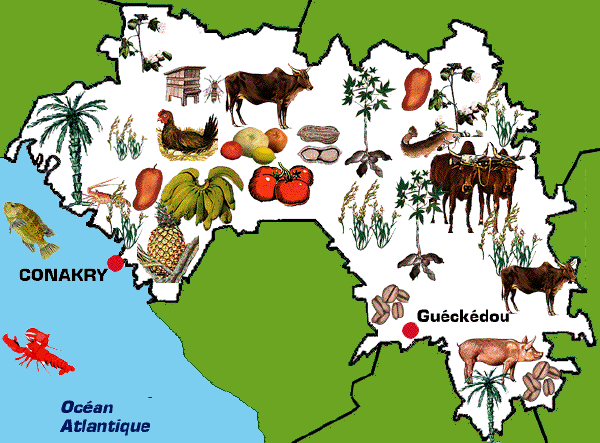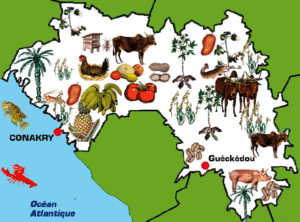
 Morocco, which has consistently and readily responded to the requests of African sisterly countries, has once again evidenced its unwavering resolve to provide assistance to one of these countries, namely Guinea where King Mohammed VI was on a work and friendship visit Thursday and Friday.
Morocco, which has consistently and readily responded to the requests of African sisterly countries, has once again evidenced its unwavering resolve to provide assistance to one of these countries, namely Guinea where King Mohammed VI was on a work and friendship visit Thursday and Friday.
To consolidate further the centuries-old ties binding Morocco and Guinea, King Mohammed VI and President Alpha Condé co-chaired over the signing ceremony of eight cooperation agreements covering, among others, the agriculture sector.
The two sides actually signed a memorandum of understanding, under which Morocco will supply the West African country with 100,000 tons of fertilizers, out of which 20,000 will be granted as a donation.
During the signing ceremony, held Thursday after talks between the two Heads of State, President Alpha Condé voiced satisfaction at the strong cooperation ties binding the two countries and underscored that the King’s visits to Guinea, mainly the visit in March 2014 and this current visit, “benefit” his country.
The King’s two visits to Guinea “benefit the country, as evidenced by the several agreements signed” between Rabat and Conakry, he pointed out.
President Condé who expressed “heartfelt thanks and gratitude” to King Mohammed VI, commended in particular Morocco’s aid to Guinea in the sector of agriculture.
Mustapha Terrab, CEO of the state-run phosphate group, OCP, said at the signing ceremony that the 100,000 tons of fertilizer would cover the needs of the current agricultural season in Guinea.
Recalling that 20,000 tons will be donated by Morocco, he said the remaining 80,000 tons will be supplied at prices that will reduce, and maybe eliminate, the Guinean government’s subsidies for fertilizers.
Guinea will be the first African country to meet the objectives of the 2006 Abuja Declaration, which aims to provide African farmers with sufficient quantities of fertilizer for their crops, he said.
Other agriculture-related agreements signed Thursday deal with the implementation of projects for the collection of maize production in Guinea, and with carrying out a hydro-project to cover a farming area extending between 200 and 300 ha.
In his address, the Guinean President also lauded Morocco’s willingness to provide all material and technical assistance to upgrade the city of Conakry and improve the road network and liquid sanitation in the country’s capital.
On Friday, the two Heads of State performed the Friday Prayers, before they visited two fishing projects (Temenitaye and Bonfi projects) that are about to be completed. The two projects that necessitated $1.28 Million investment each, were carried out by Morocco’s Mohammed VI Foundation for Sustainable Development, the Ministry of Agriculture and Fisheries and the Banque Populaire Group.
The two projects to become operational in March will directly impact the working and living conditions of over two thousand fishermen, increase the economic performance of small-scale fishing activity, organize this trade through ensuring the transparency of commercial transactions and increase fishermen’s income.
King Mohammed VI and President Condé later on launched the construction works of a new mosque in Conakry, which the sovereign baptized “The Mohammed VI Mosque”.
The religious institution that can accommodate 3,000 worshippers includes a library, a conference room, and other administrative facilities.
Secretary General of religious affairs in Guinea Abdekrim Joubati seized the opportunity to express thanks and gratitude for the King’s move to endow Conakry with such a religious landmark institution.
He also thanked the sovereign for setting up the Fez-based Mohammed VI Foundation for African Ulema.
The Foundation, dedicated in June 2015, is another milestone in the kingdom’s efforts to disseminate its Islam of the middle path, a doctrine based on tolerance, intercultural dialogue and respect of other faiths. It has branches in several African countries.
The institution, along with the Rabat institute for Imams’ training, is meant to enhance further the time-honored spiritual bonds existing between sub-Saharan African countries and Morocco, and to be a forum where Ulemas from Morocco and other African States can discuss the Islamic thought, unify and coordinate their efforts to disseminate the values of tolerant Islam, and consequently fight extremism.
Several Guinean Imams and Mourchidine and Mouchidates (religious councilors) have graduated from the Rabat institute.
King Mohammed VI left Conakry Friday afternoon heading for Côte d’Ivoire, another leg of his current African tour that also took him to South Sudan, Ghana and Zambia.
